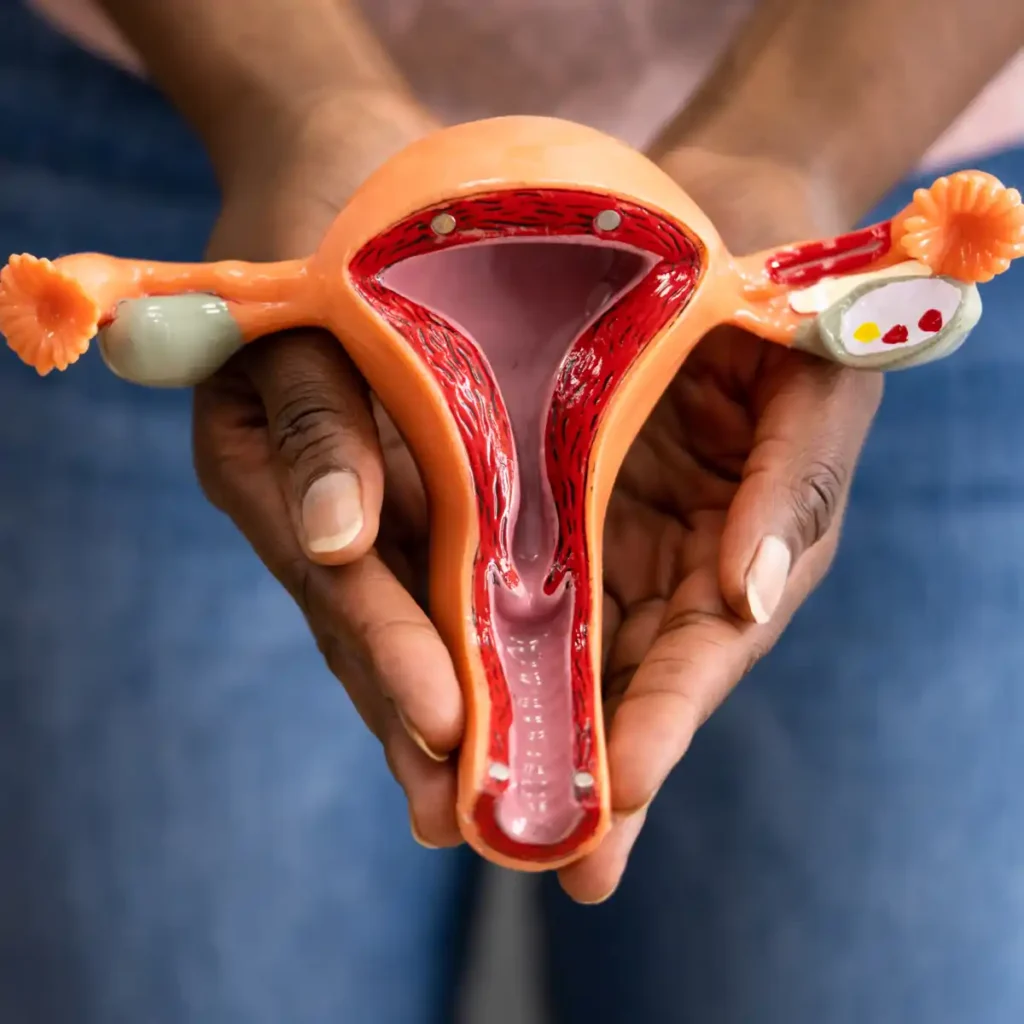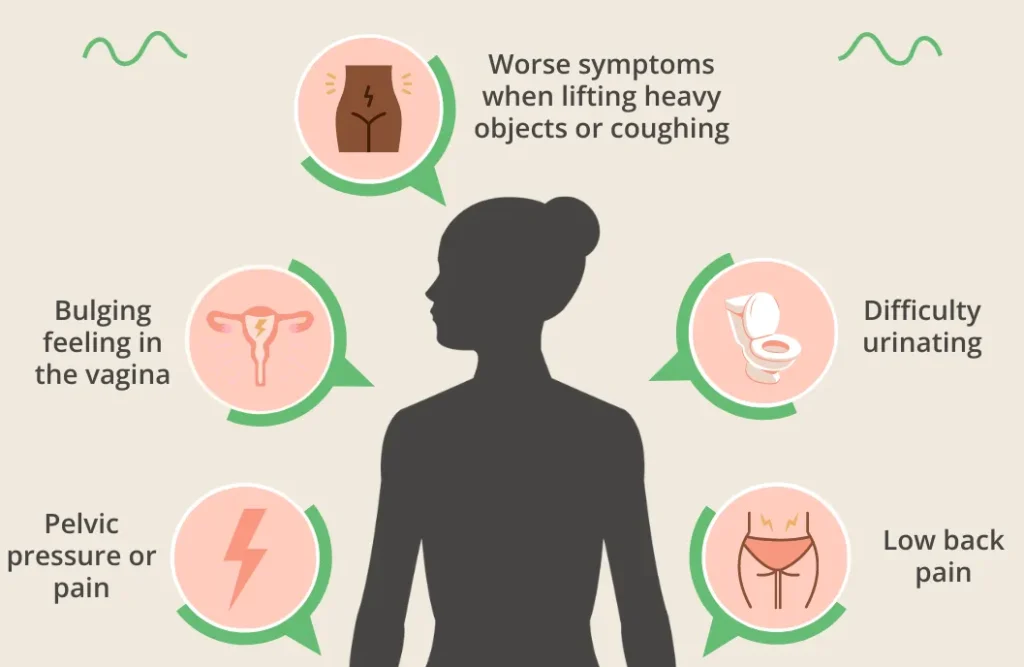A vaginal prolapse can be a difficult condition—both physically and emotionally. Many women feel uncomfortable talking about it, yet it’s more common than most people realize. Prolapse happens when the muscles and tissues that support the vagina weaken, causing the vaginal walls or organs (such as the bladder, uterus, or rectum) to bulge into the vaginal canal.
If you are experiencing this, you may notice heaviness, discomfort, or difficulty with daily activities, and it can affect your confidence and intimate life. The good news is, vaginal prolapse can be treated, and modern medical solutions make it possible to regain comfort, health, and quality of life.
At Cayra Clinic, we specialize in both non-surgical and surgical treatments for vaginal prolapse, offering personalized care to help women feel like themselves again.

What Causes Vaginal Prolapse?
There are several reasons why vaginal prolapse occurs, often linked to pressure on the pelvic floor:
Childbirth trauma (especially multiple or difficult deliveries)
Aging and menopause (decline in estrogen weakens tissues)
Chronic coughing or constipation
Heavy lifting over long periods
Obesity and excess abdominal pressure
Genetic factors (weaker connective tissue)
Understanding the cause helps in choosing the best treatment.
Symptoms of Vaginal Prolapse
Common symptoms include:
A feeling of pressure or heaviness in the vagina
Bulge or lump you can feel or see at the vaginal opening
Difficulty emptying the bladder or bowel
Pain during intimacy
Lower back or pelvic discomfort

These symptoms may range from mild to severe, but you don’t have to live with them. Effective treatments are available.
How to Fix a Vaginal Prolapse: Treatment Options
Treatment depends on the severity of prolapse, your age, lifestyle, and personal preferences. At Cayra Clinic, we provide tailored solutions:
1. Lifestyle Changes and Preventive Care
For mild prolapse, simple steps may help manage symptoms and prevent worsening:
Avoid heavy lifting
Treat constipation to reduce straining
Maintain a healthy weight
Stop smoking to reduce chronic coughing
2. Pelvic Floor Exercises (Kegels)
Strengthening the pelvic floor muscles through regular exercises can reduce symptoms and support the vagina better. Our specialists often recommend guided physiotherapy for the best results.
3. Vaginal Pessary
A pessary is a small, removable device inserted into the vagina to support pelvic organs.
Non-surgical option
Useful for women who cannot undergo surgery
Provides relief from discomfort and pressure
4. Non-Surgical Treatments
Modern medicine offers non-invasive solutions such as:
Laser Vaginal Tightening – stimulates collagen, strengthens tissues
Radiofrequency Therapy – improves elasticity and support of vaginal walls
These are safe, quick procedures with minimal downtime.
5. Vaginal Prolapse Surgery
For moderate to severe prolapse, surgical repair is the most effective option. At Cayra Clinic, our experienced surgeons offer:
Anterior Vaginal Repair (Cystocele Repair): Fixes prolapse of the bladder into the vagina.
Posterior Vaginal Repair (Rectocele Repair): Corrects prolapse of the rectum.
Uterine or Vaginal Vault Suspension: Supports the uterus or vaginal vault if they drop down.
Minimally Invasive Laparoscopic or Robotic Surgery: Less pain, faster recovery, minimal scarring.
Our goal is not only to restore anatomy but also to improve comfort, function, and quality of life.
Recovery After Vaginal Prolapse Treatment
Recovery depends on whether treatment was non-surgical or surgical:
Non-surgical treatments: Immediate return to daily activities, minimal downtime.
Surgery: Most women return home within 1–2 days. Recovery takes 4–6 weeks.
Avoid heavy lifting and sexual activity until cleared by your doctor.
Pelvic floor exercises after recovery can help maintain long-term results.
NOTE: In some cases, reconstructive procedures such as Vaginoplasty Surgery may also help restore pelvic floor function and vaginal support.
At Cayra Clinic, we provide personalized aftercare plans, ensuring a smooth and comfortable healing journey.
How Much Does Vaginal Prolapse Treatment Cost in Turkey?
One of the biggest advantages of choosing Turkey is the affordable cost combined with world-class care.
Non-surgical treatments: Start from around €1,000
Surgical repair: Typically ranges between €2,500 – €4,500 depending on the procedure
In comparison, the same surgery can cost €8,000 – €12,000 in the UK or USA. This makes Turkey a leading destination for international patients seeking high-quality yet affordable care.
Why Choose Cayra Clinic for Vaginal Prolapse Repair?
At Cayra Clinic, we understand that prolapse affects more than the body—it affects confidence, intimacy, and overall well-being. That’s why we provide:
Highly skilled surgeons specialized in pelvic floor and gynecological surgeries
State-of-the-art technology including laser and minimally invasive methods
Personalized treatment plans tailored to each patient’s needs
Comprehensive care for international patients with transfers, accommodation, and aftercare included
Clinics in Istanbul and Antalya, making treatment accessible and convenient
Our mission is simple: to help you regain your comfort, health, and confidence.
Living with a vaginal prolapse can be uncomfortable and isolating, but you are not alone—and you don’t have to suffer in silence. With today’s advanced medical techniques, there are effective solutions ranging from non-surgical treatments to minimally invasive surgeries.
At Cayra Clinic, we are committed to helping women restore their health and live without the discomfort of prolapse. With compassionate care, modern treatments, and affordable prices, we are here to support you every step of the way.
Take control of your health. Regain your confidence. Let Cayra Clinic guide you back to comfort and freedom.
For more information visit our blog page regarding to the treatments we offer. Contact us today to schedule a consultation, we look forward to helping you on your journey to better health!
Frequently Asked Questions (FAQ)
Is vaginal prolapse surgery painful?
No, vaginal prolapse surgery is generally well-tolerated. At Cayra Clinic, anesthesia is used to ensure a pain-free procedure. Post-surgery discomfort is usually mild and can be managed with prescribed medications. Most patients resume light activities within a few days.
Can vaginal prolapse come back after treatment?
While surgery and non-surgical treatments are highly effective, recurrence can happen if risk factors like chronic straining, obesity, or weak pelvic floor muscles persist. Following your doctor’s aftercare plan and pelvic floor exercises greatly reduces the chances of recurrence.
Are there non-surgical options to fix vaginal prolapse?
Yes! Mild prolapse can often be treated with pelvic floor exercises (Kegels), vaginal pessaries, or laser therapy. These options provide relief, improve tissue support, and may delay or even prevent the need for surgery.
How long does recovery take after vaginal prolapse surgery?
Recovery varies depending on the procedure. Most patients return home within 1–2 days. Full recovery, including returning to normal physical activities and sexual activity, usually takes 4–6 weeks. Your doctor will provide a personalized plan to ensure a safe and smooth recovery.
How much does vaginal prolapse surgery cost at Cayra Clinic?
At Cayra Clinic in Turkey, surgical repair costs typically range from €2,500 to €4,500, depending on the complexity of the procedure. Non-surgical treatments start from around €1,000. These prices are significantly lower than in the UK or USA, while maintaining world-class quality and care.
Is vaginal prolapse treatment safe for older women?
Absolutely. Treatment is safe for women of all adult ages, though the approach may vary based on overall health and severity of prolapse. Our specialists at Cayra Clinic customize every treatment to ensure safety and optimal results.
